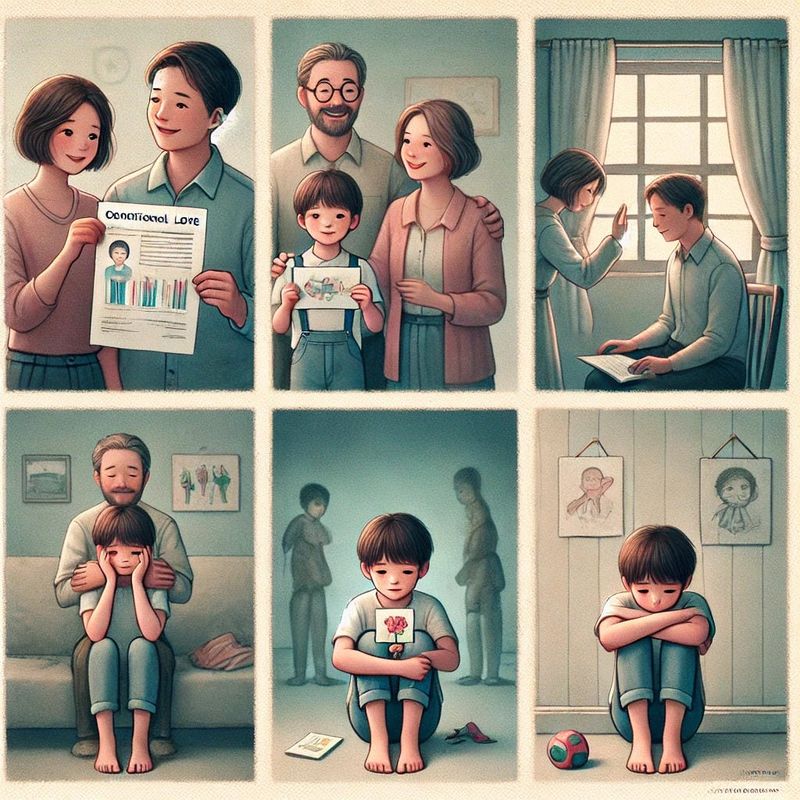Do you ever look back at your childhood and realize you grew up in a house where love felt like a contest, and the scoreboard was always tilted in someone else’s favor?
I wish someone had told us when we were kids: You weren’t crazy. You weren’t too sensitive. Some parents really can make everything about themselves—even when their child just needed to feel seen. If any of this feels too close to home, let’s just say you’re not alone.
Here’s what I wish I’d known sooner: these are the 15 real-deal signs your mom or dad might be a narcissist. And no, you’re not imagining it.
1. Excessive Self-Centeredness
Picture this: It’s your birthday, but somehow the conversation flips, and suddenly your parent is talking about their childhood party. You blink, wondering if anyone noticed how fast your special day got hijacked. That’s what living with a self-centered parent feels like—your moments aren’t really your own.
Narcissistic parents have a knack for making every family event circle back to them. If you succeeded at something, they either took the credit or reminded everyone how hard they worked to get you there.
The worst part is how normal it starts to feel. For years, you just accepted their needs came first, sometimes thinking you were selfish for wanting anything else. Deep down, though, you always wished you mattered as much as they did.
2. Lack of Empathy
Ever confided in your parent, only to get a blank stare or a quick change of subject? It’s like speaking a language they never cared to learn. That sting—the one where you realized you’d have to handle life’s messes alone—cuts deep.
These parents treat your feelings as inconvenient background noise. Maybe you learned to hide your hurts or started believing your emotions were too much. You might even feel guilty for needing comfort.
Over time, this lack of empathy rewrites the script in your head. You stop expecting understanding and start bracing for dismissal. That’s not just cold; it’s a silent kind of lonely that sticks with you longer than anyone admits.
3. Manipulation and Guilt-Tripping
“After all I’ve done for you…” If that phrase still echoes in your brain, you know just how sharp manipulation can cut. These parents weaponize guilt like it’s an Olympic sport—they twist the knife with reminders of sacrifice.
At times it’s outright threats of withdrawal, other times it’s that look: the one that says you’re a disappointment for having boundaries. It’s exhausting trying to please someone who keeps moving the target.
You question your own judgment, wonder if you’re ungrateful, and maybe even apologize for things you didn’t do. That’s not normal parenting—it’s emotional blackmail, plain and simple.
4. Need for Constant Admiration
Did you ever felt like your parent needed a standing ovation just for showing up? Some folks crave a little praise, but with a narcissistic parent, it never stops. Your achievements become props in their personal highlight reel.
No matter what you did, it was either never enough or only worth mentioning if it made them look good. You probably got used to clapping for their smallest wins, even when you needed support yourself.
The hunger for admiration can leave you feeling invisible—or worse, like a supporting character in their story. And all the while, nobody’s applauding you for surviving it all.
5. Boundary Violations
Remember the time your diary went missing, or you caught your parent reading your texts? Trust me, you weren’t being paranoid. With parents like this, privacy is a foreign concept—they walk right through boundaries like they own the place.
It wasn’t just your stuff, either. Maybe they shared your secrets with family, or made decisions for you without asking. Saying "no" felt risky; you learned early that your wishes were just suggestions.
Living without boundaries can make you feel exposed. You might struggle to set limits as an adult, still hearing their voice asking, “What’s yours is mine, right?”
6. Emotional Volatility
Did you tiptoed around your parent, scanning their face to guess if tonight would be calm or chaos? Emotional whiplash is real. Their mood swings could turn a silent dinner into a war zone—and leave you picking up the pieces.
You probably became a world-class emotional weather forecaster, always bracing for storms. Maybe you learned to be the peacemaker or the invisible one, just to keep the peace for a little longer.
That kind of unpredictability seeps in deep. Even now, you might find yourself on edge when things get too quiet, always waiting for the next outburst.
7. Competitive with Their Own Children
It’s wild, right? Your parent acting jealous or competitive—not with neighbors, but with you. Maybe they downplayed your wins, or even tried to top your stories at family events.
Sometimes, it almost felt like they saw you as a threat. You worked so hard for their approval, but every step forward made them pull away. The line between pride and rivalry blurred until you were afraid to shine too brightly.
Years later, you still catch yourself shrinking so others don’t feel small. That competition didn’t build you up—it chipped away at your sense of self.
8. Gaslighting
“That never happened.” “You’re too sensitive.” Those words can mess with your head. Gaslighting isn’t just a buzzword; it’s the slow erosion of trust in your own reality.
With a narcissistic parent, you start doubting your memories, second-guessing your instincts, and feeling lost in your own story. One day you realize: you no longer trust what you feel or remember.
It can take years to unlearn that doubt. But gaslighting isn’t love—it’s a power play. You deserved truth, not a lifetime of confusion.
9. Sense of Entitlement
Ever see your parent demand the best seat, the last word, or the most attention, no matter the occasion? That sense of entitlement wasn’t just annoying—it changed the whole dynamic.
They acted as if the world owed them, especially their own kids. If you dared push back, you probably got hit with guilt or anger. Any hint that their needs weren’t top priority felt like betrayal.
Living with that expectation teaches you to put yourself last. You may still catch yourself catering to others, haunted by their voice demanding more. That’s not healthy giving; that’s old survival mode.
10. Inability to Apologize
Apologies? Forget it. With a narcissistic parent, owning up to mistakes was like asking for a unicorn. Even when they messed up, the blame somehow landed on you or the universe.
You learned to apologize first, even when you weren’t wrong, just to keep the peace. Eventually, saying sorry felt like your job, not theirs. That cycle leaves a mark—self-doubt, guilt, and the nagging sense that your feelings don’t count.
Real adults say “sorry” and mean it. If your parent couldn’t, that wound runs deeper than they’ll ever admit.
11. Overly Critical Behavior
Maybe you remember the first time you showed off something you made, and instead of a smile, you got a list of what to fix. For some, criticism stings; for others, it’s just background noise. But when it comes from your parent, it’s a slow drip of never good enough.
These parents pick at your flaws, set impossible standards, and rarely celebrate your wins. Over time, you start to expect rejection, not encouragement. You adapt—by shrinking, hustling harder, or hiding your true self.
You might still hear that critical voice, even now. But their standards were about control, not your worth.
12. Conditional Love
Did you ever felt like love was a prize you had to win—and one misstep meant starting over from scratch? This isn’t just painful; it scrambles your sense of security at its core.
They dole out affection when you meet their standards, then freeze you out when you fall short. It’s like living on emotional quicksand, never sure where you stand.
That uncertainty follows you, making every relationship feel like a test. Real love isn’t a transaction; it’s a place to land. Don’t let them convince you otherwise.
13. Emotional Manipulation
Have you ever hung up the phone with your parent and felt like somehow, you owed them the rest of your day? This manipulation is sneaky—it plants seeds of guilt, obligation, and confusion that grow in the cracks of your confidence.
They use your love against you. They twist expectations, making you feel responsible for their happiness. You end up over-explaining, over-apologizing, and giving up parts of yourself just to keep the peace.
That quiet drain on your spirit isn’t love—it’s control. You have every right to set boundaries, even if it makes them uncomfortable.
14. Inflexibility and Defensiveness
Try getting a narcissistic parent to admit they’re wrong or open to change—might as well argue with a brick wall. Their way was the only way, and any challenge felt like a personal attack.
Maybe you learned to tiptoe or sugarcoat your feedback, just to avoid their anger. Even gentle suggestions were met with offense or icy silence. That rigidity made it impossible to have honest, growing relationships.
At times, the hardest part isn’t breaking old habits, but believing you’re allowed to have your own opinions now. The world doesn’t end when you disagree—and neither should love.
15. Victim Mentality
Somehow, no matter what happened, your parent ended up the one who suffered most. Their talent for flipping every story into a tragedy—where you’re the villain and they’re the wounded hero—could win awards.
You grew up feeling like normal boundaries were betrayals, and your needs didn’t matter next to their pain. Any attempt to address the truth got spun into another tale of their hardship.
It’s not selfish to want your story told honestly. Their victimhood isn’t your burden to carry—you get to be the hero of your own life now.
















